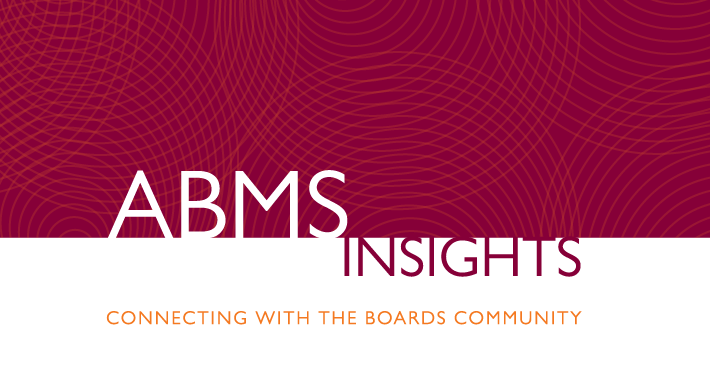
American Board of Medical Specialties (ABMS) Member Boards remain committed to supporting diversity, equity, and inclusion (DEI) efforts in the workplace. In the past two years, more Member Boards have expanded their efforts to identify both governance and organization-wide opportunities to promote DEI. The following are a handful of examples of how different boards are creating a more diverse and inclusive culture within their respective organizations.
Forming DEI standing committees
Many of the 24 Member Boards have established task forces and/or committees to create greater diversity in their governance. Some of these groups are standing DEI committees that report directly to the board’s Board of Directors (BOD). Over time, the groups have broadened their efforts beyond governance to address organization-wide DEI issues.

In 2018, the American Board of Anesthesiology (ABA) created a DEI task force to develop a plan to increase racial, ethnic, and gender diversity on the BOD. The task force led DEI efforts through 2023 when it was replaced with a DEI advisory group, establishing a more permanent structure for these efforts and broader goals. The 18-member advisory group is charged with reviewing prospective DEI initiatives and providing input and recommendations to the BOD in support of its goal to weave DEI into ABA’s culture as well as addressing health care disparities in the context of initial and continuing certification.
In 2022, the American Board of Internal Medicine’s (ABIM) BOD created the Equity Committee to inform the board’s DEI activities. The Equity Committee, composed of ABIM and ABIM Foundation governance members, is charged with ensuring that ABIM’s programs, including assessments, are fair, equitable, and free of bias. ABIM also created an internal DEI Task Force composed of volunteer employees working to create, build, and grow a sense of inclusion and belonging in the workplace.
The American Board of Obstetrics and Gynecology (ABOG) formed DEI committees at both the staff and governance level as part of its Strategic Plan in 2016. The groups work together to develop, plan, and execute initiatives that embody and fulfill ABOG’s commitment to equitable and fair representation across the organization. As part of its current strategic planning process, ABOG’s BOD is revisiting the board’s strategic DEI priorities with updates expected in 2025.
In 2023, the American Board of Orthopaedic Surgery’s (ABOS) BOD changed its bylaws to create a DEI Committee. Previously, the BOD created a DEI Task Force but decided that it should become a full, standing Board committee. The DEI Committee, which collaborates closely with other ABOS committees, oversaw a DEI evaluation of all ABOS programs and processes by an outside consultant and is now managing implementation of the consultant’s recommendations.
The American Board of Surgery’s (ABS) standing DEI Committee is tasked with advancing DEI initiatives at the trainee and diplomate levels. The Committee meets periodically throughout the year to work on these initiatives, and the Committee Chair provides an annual report to the ABS Council. Additionally, the Chief DEI Officer provides a report at least annually to the ABS BOD.
The American Board of Psychiatry and Neurology’s (ABPN) DEI Committee developed a DEI Strategic Action Plan approved by the BOD in 2023. ABPN reports progress on the action items spanning ABPN’s staff, internal structures, and workplace culture; certification programs; and external communications and collaborations on its website.
Most Member Boards are also evaluating their bylaws, policies, and processes aimed at achieving greater diversity of members serving in leadership roles and volunteer groups. After reviewing these documents, ABOG introduced a self-nomination volunteer process in 2022 in addition to collecting demographic data through its Specialty Certifying Examination application process. Similarly, the American Board of Allergy and Immunology introduced a self-nomination pathway for BOD members as well as Test Writing Committee and Ambassador Program positions in 2021 that complements its Specialty Society nomination pathway.
Some Member Boards, such as the American Boards of Neurological Surgery and Thoracic Surgery, have asked their partnering organizations to consider diversity when nominating individuals to serve on the boards’ committees and governance. Some boards, such as ABOS and the American Board of Plastic Surgery, have taken the additional step of reaching out to underrepresented organizations within their specialties to recruit volunteers. The ABIM Council approved a resolution to require an early-career seat on all its Specialty Boards.
Collecting robust demographics
While nearly all Member Boards collect demographic data about their governance members, two-thirds of the boards collect these data for nominees for service on committees.
The American Board of Emergency Medicine’s (ABEM) efforts to collect a wide variety of demographic categories of its governance members, volunteers, and board certified physicians (also known as diplomates) have increased the diversity of candidates for leadership positions and volunteer roles on the BOD and various committees. These efforts have also created pathways for volunteers to support many other efforts and initiatives. Among them are Certifying Exam case development, research, and the Dr. Leon Haley, Jr. Bridge to the Future of Emergency Medicine Academy.
Both ABIM and the American Board of Family Medicine (ABFM) have been collecting demographic data for the past 10 years. The data ABIM has collected on governance members has been instrumental in shaping the board’s recruitment and appointment processes. The data has been used to identify future gaps in demographic groups and to help tailor ABIM’s outreach efforts to ensure a more inclusive pool of candidates, resulting in more balanced and representative committees and boards.
ABFM originally collected race and ethnicity data to assess the fairness of its certification exam across demographics through differential item functioning analysis.* More recently, the board developed a broad formal definition of diversity to guide its data collection. In addition to race and ethnicity, the definition covers underrepresented in medicine, gender, rural/community practice, and osteopathic education. ABFM uses the data to recruit and select item writers, national journal committee members, and BOD members. The formal definition allows ABFM to track progress across its BOD and committees. ABFM also reports the data to the specialty, diplomates, and many specialty societies and groups, and has published articles on the data as it relates to health equity and diversity.
The American Board of Ophthalmology tracks and publicly reports data on the race, ethnicity, and gender of its board members and staff on its Candid (GuideStar) profile. Demographic data is collected from volunteers on an optional basis and is being evaluated in a study to determine the demographic composition of oral examiners across several surgical specialties.
Two-thirds of the Member Boards are collecting more robust demographic data on their staff, as well. Boards including ABFM, ABIM, and ABOG are using employee demographics to compare their data with statewide data and/or industry standards. They use the data to assess and promote diversity and inclusion within the organization; identify areas where they may need to improve recruitment, retention, and promotion practices; and measure their progress.
Implementing DEI principles
Most boards either reviewed their Human Resources processes or are in the process of reviewing them. Almost all boards have in place organizational DEI principles and priorities or are working on identifying them. ABS utilizes a holistic hiring approach that looks at a candidate’s skills, experiences, personality, and cultural fit. It also considers a candidate’s potential for growth and development. This approach differs from traditional hiring methods, which may focus solely on a candidate’s qualifications for a specific role. It involves using structured interviews, diverse hiring panels, and unconscious bias training for all staff involved in hiring and promotions.

The American Board of Pediatrics (ABP) transitioned its DEIB (the B is for belonging) Council to reside within Human Resources to address people, culture, and belonging. It is tasked with proactively embedding DEIB principles in ABP processes, policies, and procedures; shaping a culture that supports ABP’s underlying beliefs, vision, mission, values, behaviors, and practices; and developing a collective understanding of DEIB principles across the organization.
ABFM has updated its Policy and Procedures Handbook and overhauled its written materials. A Branding and Style Guidelines document was created to assist staff in effectively communicating with language that does not imply ethnic, cultural, racial, or gender bias. ABFM is in the process of revising its Personnel Manual that will require annual DEI training moving forward.
Through ABEM’s DEI Staff Workgroup, ongoing efforts are made to ensure DEI training, DEI-related resources, and professional development opportunities are available to staff. At the same time, the Workgroup has conducted annual surveys to help evaluate ABEM’s DEI engagement initiatives and efforts to increase DEIB within the organization.
In 2021, ABA published DEI guiding principles. In 2023, the board developed and distributed Codes of Conduct for the BOD, volunteers, and staff.
Offering staff programming
Most Member Boards have implemented implicit bias training for leadership and staff or are in the process of implementing this training. The virtual unconscious bias workshop that ABEM hosted in 2023 for its leadership was so successful that the board hosted an in-person workshop for its entire staff shortly thereafter. ABS leadership and staff participate in ongoing training focused on different aspects of DEI such as allyship, cultural competence/dexterity/responsiveness, microbehaviors, emotional intelligence, and neurodivergence. Similarly, ABIM offers periodic inclusivity training for leadership and all staff regarding implicit bias.
Member Boards have also created programming and initiatives aimed at educating and informing colleagues about racism. These include discussion forums, book clubs, guest speakers, volunteer efforts, and professional development opportunities.
What started as the Diverse Voices Speaker Series to further ABS’ efforts to create a DEI culture within the house of surgery has morphed into a collaborative effort among ABS and ABA, ABIM, ABOG, and the American Board of Physical Medicine and Rehabilitation. Since 2022, the boards have hosted several Speaker Series talks—typically with 100-plus attendees—held during Black History Month, Women’s History Month, Asian American and Pacific Islander Month, Pride/LGTBQIA+ Month, Arab-American Heritage Month, and National Disability Employment Awareness Month, as well as in recognition of Juneteenth, Rosh Hashanah, and Veterans Day. Other ABS programming includes a staff retreat featuring DEI consultants/facilitators, a DEI Pulse Survey via 1-on-1 Coffee Chats with Staff, a monthly DEI Resource Club, a bi-annual DEI Check-in with Department Heads, a DEI Virtual Chatroom, DEI Office Hours (as needed), and DEI in-person events for recognition months such as a Juneteenth Walking Tour and Lunch.
The ABEM Staff DEI Workgroup developed an annual DEI Learning Pathway reflecting staff preferences for activities, topics, and engagement frequency. Staff are required to participate in three hours of DEI-focused activities each quarter; 12 hours annually. The Workgroup captures feedback on the programs to ensure that the Learning Pathway is sustainable with relevant and valued material.
Each year, ABFM sponsors an educational symposium and intranet article on Juneteenth, on? Black history, and/or an equity related topic. By way of a raffle, employees are awarded opportunities to visit local black-owned businesses. The board’s annual Juneteenth Celebration provides an opportunity to celebrate diversity. Additionally, all staff are required to participate in an annual online harassment prevention training course.
One of the more recent activities introduced at ABIM are periodic Inclusive Discussions, which are facilitated group conversations regarding challenging topics such as treating transitioning patients, dismantling stereotypes about people with disabilities, and being an active ally to those in the LGBTQIA+ community. These discussions are designed to challenge outdated ideas, educate, and inspire.
ABMS Member Boards are committed to advancing DEI across their organizations. With a more balanced and representative governance and workforce, the boards will be better equipped to address the needs and challenges of the diverse populations they serve.
*DIF analysis is a statistical method that identifies potentially biased items in assessments.
Follow ABMS Member Boards’ DEI Journeys
American Board of Medical Specialties (ABMS) Member Boards have a unique and distinct role in improving diversity, equity, and inclusion (DEI) in health care. Their efforts range from creating a more diverse and inclusive culture within their organizations to improving health equity and reducing health disparities across the specialties.
Some Member Boards have chosen to share their DEI journeys, relaying their broader strategies and specific steps as they move toward greater diversity, equity and inclusiveness in delivering health care services. Learn more about the following boards’ DEI efforts:
- American Board of Anesthesiology
- American Board of Emergency Medicine
- American Board of Internal Medicine
- American Board of Obstetrics and Gynecology
- American Board of Pediatrics
- American Board of Psychiatry and Neurology
© 2024 American Board of Medical Specialties
Read the latest issue of ABMS Insights and sign up to receive future updates about board certification.
-
Read More:
- ABMS Insights |
- Member Boards |
